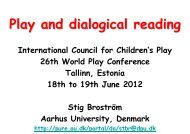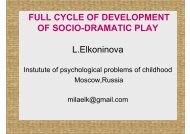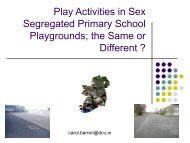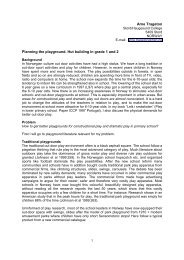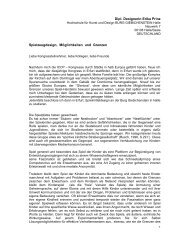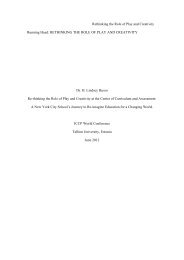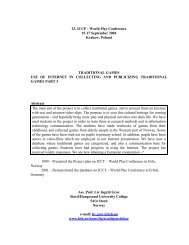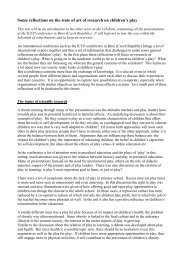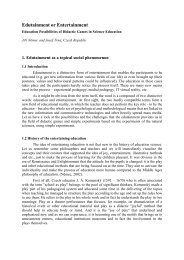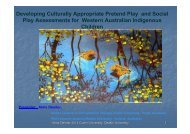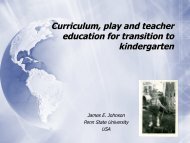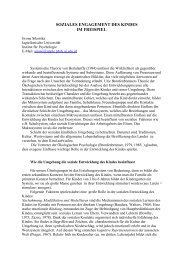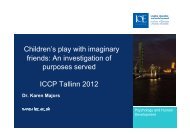Dr Milda Bredikyte
Dr Milda Bredikyte
Dr Milda Bredikyte
You also want an ePaper? Increase the reach of your titles
YUMPU automatically turns print PDFs into web optimized ePapers that Google loves.
Adult Play Guidance and<br />
Children’s Play<br />
Development<br />
<strong>Milda</strong> <strong>Bredikyte</strong><br />
Kajaani unit of Teacher Education, University of Oulu, Finland<br />
now at Lithuanian University of Educational Sciences,<br />
1<br />
Vilnius, Lithuania<br />
6/18/2012 ICCP conference, Tallinn 18.-19.6. 2012
Contrasting views concerning adult’s role in<br />
enhancing children’s play:<br />
Scandinavian “free” play approach<br />
recommends that adults let children play alone<br />
Russian “didactic” play approach instructs<br />
“correct” play to children<br />
ICCP conference, Tallinn 18.-19.6. 2012<br />
6/18/2012
Problems of play development<br />
According to some researchers (Mikhailenko & Korotkova,<br />
2001, Bodrova & Leong, 2007) an increasing number of<br />
children do not develop mature forms of play before school<br />
age<br />
Possible solution: adult intervention<br />
Our project trains teacher education students how to<br />
intervene effectively in children’s play in order to support<br />
the development of more mature forms of play (narrative<br />
role-play)<br />
3<br />
ICCP conference, Tallinn 18.-19.6. 2012<br />
6/18/2012
We understand children’s play as<br />
The main age-appropriate form of learning & development:<br />
1. The primary form of a child’s thinking - a movement from<br />
‘thinking’ using body movements and actions (gesture<br />
language) to thinking in words (concepts) (Vygotsky)<br />
2. Nonverbal form of narration: a child uses play as a medium<br />
to create narratives about himself and the world.<br />
A substantial feature of mature narrative role-play is the<br />
ability of the players to develop shared ideas and to<br />
construct a plot (storyline) together.<br />
4<br />
ICCP conference, Tallinn 18.-19.6. 2012<br />
6/18/2012
Developed narrative role-play<br />
Criteria of mature narrative role-play:<br />
• Social, co-constructed (2 and more participants)<br />
• Imaginative (based on productive imagination)<br />
• Creative (not stereotypical)<br />
• Lasting in time (may last several months and develops over<br />
time)<br />
• Challenging (demands action at the highest level of play<br />
skills)<br />
• Has narrative structure<br />
5<br />
ICCP conference, Tallinn 18.-19.6. 2012<br />
6/18/2012
Our approach to play guidance was elaborated in the<br />
play laboratory Silmu at Kajaani University Consortium<br />
in 2002 – 2010<br />
Adult role was not only to observe children’s play, but<br />
also to intervene, actively play, and to construct play<br />
together<br />
University students had a task to plan, guide and<br />
observe joint play with different age groups of children<br />
Different types of evaluative materials were collected<br />
about guidance and play activities one day a week<br />
(plans, field notes, video tapes, observation protocols<br />
etc.)<br />
ICCP conference, Tallinn 18.-19.6. 2012<br />
6/18/2012
Creative drama interventions<br />
Creative drama methods are used for interventions<br />
(Lindqvist, 1995; <strong>Bredikyte</strong>, 2001): adults and children in<br />
roles “act out” different adventures of the characters<br />
The main goal is to involve children to the process of<br />
active exploration, experiencing (perezhivanie) and<br />
reflection & to support the development of more mature<br />
forms of play<br />
Joint creativity (child-adult) and improvisation is the<br />
central focus<br />
7<br />
ICCP conference, Tallinn 18.-19.6. 2012<br />
6/18/2012
The most significant aspects of a<br />
successful adult intervention:<br />
a) motivating shared theme;<br />
b) active “in role” participation;<br />
c) emotional involvement;<br />
d) dialogic character of interactions;<br />
e) dramatic tension in play script;<br />
f) coherent and fascinating script;<br />
g) elaboration of the “critical” turns in play.<br />
ICCP conference, Tallinn 18.-19.6. 2012<br />
6/18/2012
Students reflections I<br />
1. It is not simple to play with children, participation in<br />
play requires:<br />
• Learning the “language” of play<br />
• Real involvement - “once accepted you really<br />
have to play, not just ‘pretend’ that you are<br />
playing…”<br />
2. Play with children is a challenge but also a pleasure.<br />
3. Playing requires creative thinking, improvisational<br />
skills and the courage to explore new possibilities.<br />
4. Children like adults who play with them; they view<br />
them as friends…<br />
ICCP conference, Tallinn 18.-19.6. 2012<br />
6/18/2012
Students reflections II<br />
5. Playing with children helps to understand their ideas<br />
and their thinking better.<br />
6. It is amazing how easily an adult in role can influence<br />
a child’s behaviour!<br />
7. If children are deeply involved in play they are able to<br />
concentrate well for a long time.<br />
8. If play is motivating children can learn many things<br />
which are necessary for the activity.<br />
9. The ability required of the teacher is to learn to be<br />
involved in play and to be able to observe the whole<br />
situation as if from the outside at the same time.<br />
ICCP conference, Tallinn 18.-19.6. 2012<br />
6/18/2012
Who is playing, teaching, learning, &<br />
developing?<br />
The goal of student intervention is to develop joint play<br />
activity (taking roles and participating in play)<br />
Students are not experts of play. In play they “learn” to<br />
play and at the same time “teach” children to play<br />
(modeling play behavior)<br />
“Learning” of all participants is a result of joint play<br />
activity<br />
Spontaneous “free learning”: holistic and participatory,<br />
proceeds through search activity, careful observation and<br />
gradual imitation.<br />
11<br />
ICCP conference, Tallinn 18.-19.6. 2012<br />
6/18/2012
Conclusions<br />
Analysis of collaborative interactions revealed that adult<br />
participation in joint play activities creates the space<br />
supportive for the development of all participants (both<br />
children and adults).<br />
Playworld is a tool that moves participants into<br />
collaborative co-construction of shared activity system and<br />
prepares the next developmental step (self-development) in<br />
children + professional & personality development in<br />
adults.<br />
12<br />
ICCP conference, Tallinn 18.-19.6. 2012<br />
6/18/2012
Growth on personality level?<br />
Genuine participation in shared play activities is very<br />
difficult for many students (adults). This process requires<br />
“stepping out” of one’s own understanding and “meeting”<br />
understanding of “another”<br />
But if this happens all the participants become involved in<br />
creative process that bring change in participants by moving<br />
them to a new level of functioning and understanding -<br />
deep, experiential learning.<br />
13<br />
ICCP conference, Tallinn 18.-19.6. 2012<br />
6/18/2012
Thank you!<br />
milda.bredikyte@gmail.com<br />
milda.bredikyte@vpu.lt<br />
ICCP conference, Tallinn 18.-19.6. 2012<br />
6/18/2012



